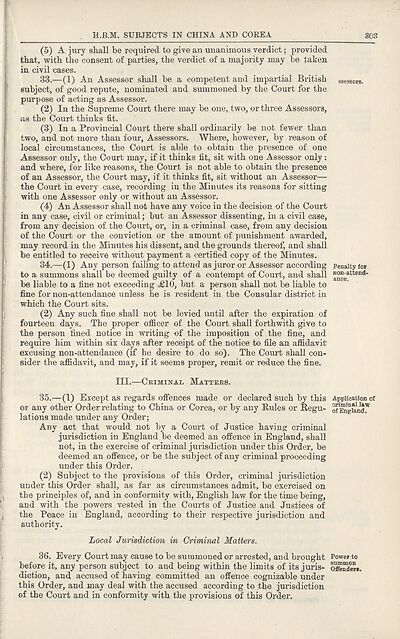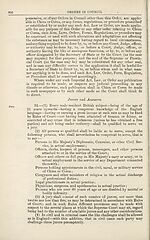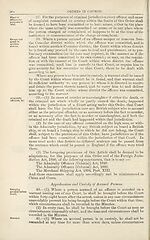1924
(359) Page 303
Download files
Complete book:
Individual page:
Thumbnail gallery: Grid view | List view

H.B.M. SUBJECTS IN CHINA AND COEEA
303
(5) A jury shall be required to give an unanimous verdict; provided
that, with the consent of parties, the verdict of a majority may be taken
in civil cases.
33. —(1) An Assessor shall be a competent and impartial British ssessore.
subject, of good repute, nominated and summoned by the Court for the
purpose of acting as Assessor.
(2) In the Supreme Court there may be one, two, or three Assessors,
as the Court thinks fit.
(3) In a Provincial Court there shall ordinarily be not fewer than
two, and not more than four, Assessors. Where, however, by reason of
local circumstances, the Court is able to obtain the presence of one
Assessor only, the Court may, if it thinks fit, sit with one Assessor only:
and where, for like reasons, the Court is not able to obtain the presence
of an Assessor, the Court may, if it thinks fit, sit without an Assessor—
the Court in every case, recording in the Minutes its reasons for sitting
with one Assessor only or without an Assessor.
(4) An Assessor shall not have any voice in the decision of the Court
in any case, civil or criminal; but an Assessor dissenting, in a civil case,
from any decision of the Court, or, in a criminal case, from any decision
of the Court or the conviction or the amount of punishment awarded,
may record in the Minutes his dissent, and the grounds thereof, and shall
be entitled to receive without payment a certified copy of the Minutes.
34. —(1) Any person failing to attend as juror or Assessor according Penalty for
to a summons shall be deemed guilty of a contempt of Court, and shall “°“eattend'
be liable to a fine not exceeding <£10, but a person shall not be liable to
fine for non-attendance unless he is resident in the Consular district in
which the Court sits.
(2) Any such fine shall not be levied until after the expiration of
fourteen days. The proper officer of the Court shall forthwith give to
the person fined notice in writing of the imposition of the fine, and
require him within six days after receipt of the notice to file an affidavit
excusing non-attendance (if he desire to do so). The Court shall con¬
sider the affidavit, and may, if it seems proper, remit or reduce the fine.
III.—Ckiminal Matters.
35. — (1) Except as regards offences made or declared such by this Application of
or any other Order relating to China or Corea, or by any Buies or Regu-
lations made under any Order;
Any act that would not by a Court of Justice having criminal
jurisdiction in England be deemed an offence in England, shall
not, in the exercise of criminal jurisdiction under this Order, be
deemed an offence, or be the subject of any criminal proceeding
under this Order.
(2) Subject to the provisions of this Order, criminal jurisdiction
under this Order shall, as far as circumstances admit, be exercised on
the principles of, and in conformity with, English law for the time being,
and with the powers vested in the Courts of Justice and Justices of
the Peace in England, according to their respective jurisdiction and
authority.
Local Jurisdiction in Criminal Matters.
36. Every Court may cause to be summoned or arrested, and brought Power to
before it, any person subject to and being within the limits of its juris- offi^der».
diction, and accused of having committed an offence cognizable under
this Order, and may deal with the accused according to the jurisdiction
of the Court and in conformity with the provisions of this Order.
303
(5) A jury shall be required to give an unanimous verdict; provided
that, with the consent of parties, the verdict of a majority may be taken
in civil cases.
33. —(1) An Assessor shall be a competent and impartial British ssessore.
subject, of good repute, nominated and summoned by the Court for the
purpose of acting as Assessor.
(2) In the Supreme Court there may be one, two, or three Assessors,
as the Court thinks fit.
(3) In a Provincial Court there shall ordinarily be not fewer than
two, and not more than four, Assessors. Where, however, by reason of
local circumstances, the Court is able to obtain the presence of one
Assessor only, the Court may, if it thinks fit, sit with one Assessor only:
and where, for like reasons, the Court is not able to obtain the presence
of an Assessor, the Court may, if it thinks fit, sit without an Assessor—
the Court in every case, recording in the Minutes its reasons for sitting
with one Assessor only or without an Assessor.
(4) An Assessor shall not have any voice in the decision of the Court
in any case, civil or criminal; but an Assessor dissenting, in a civil case,
from any decision of the Court, or, in a criminal case, from any decision
of the Court or the conviction or the amount of punishment awarded,
may record in the Minutes his dissent, and the grounds thereof, and shall
be entitled to receive without payment a certified copy of the Minutes.
34. —(1) Any person failing to attend as juror or Assessor according Penalty for
to a summons shall be deemed guilty of a contempt of Court, and shall “°“eattend'
be liable to a fine not exceeding <£10, but a person shall not be liable to
fine for non-attendance unless he is resident in the Consular district in
which the Court sits.
(2) Any such fine shall not be levied until after the expiration of
fourteen days. The proper officer of the Court shall forthwith give to
the person fined notice in writing of the imposition of the fine, and
require him within six days after receipt of the notice to file an affidavit
excusing non-attendance (if he desire to do so). The Court shall con¬
sider the affidavit, and may, if it seems proper, remit or reduce the fine.
III.—Ckiminal Matters.
35. — (1) Except as regards offences made or declared such by this Application of
or any other Order relating to China or Corea, or by any Buies or Regu-
lations made under any Order;
Any act that would not by a Court of Justice having criminal
jurisdiction in England be deemed an offence in England, shall
not, in the exercise of criminal jurisdiction under this Order, be
deemed an offence, or be the subject of any criminal proceeding
under this Order.
(2) Subject to the provisions of this Order, criminal jurisdiction
under this Order shall, as far as circumstances admit, be exercised on
the principles of, and in conformity with, English law for the time being,
and with the powers vested in the Courts of Justice and Justices of
the Peace in England, according to their respective jurisdiction and
authority.
Local Jurisdiction in Criminal Matters.
36. Every Court may cause to be summoned or arrested, and brought Power to
before it, any person subject to and being within the limits of its juris- offi^der».
diction, and accused of having committed an offence cognizable under
this Order, and may deal with the accused according to the jurisdiction
of the Court and in conformity with the provisions of this Order.
Set display mode to:
![]() Universal Viewer |
Universal Viewer | ![]() Mirador |
Large image | Transcription
Mirador |
Large image | Transcription
Images and transcriptions on this page, including medium image downloads, may be used under the Creative Commons Attribution 4.0 International Licence unless otherwise stated. ![]()
| Asian directories and chronicles > 1924 > (359) Page 303 |
|---|
| Permanent URL | https://digital.nls.uk/196428576 |
|---|
| Attribution and copyright: |
|
|---|---|
| Description | Volumes from the Asian 'Directory and Chronicle' series covering 1917-1941, but missing 1919 and 1923. Compiled annually from a multiplicity of local sources and research. They provide listings of each country's active corporations, foreign residents and government agencies of all nationalities for that year, together with their addresses. Content includes: various treaties; coverage of conflicts; currencies and taxes; consular fees; weights and measures; public holidays; festivals and traditions. A source of information for both Western states and communities of foreigners living in Asia. Published by Hongkong Daily Press. |
|---|---|
| Shelfmark | H3.86.1303 |
| Additional NLS resources: |

